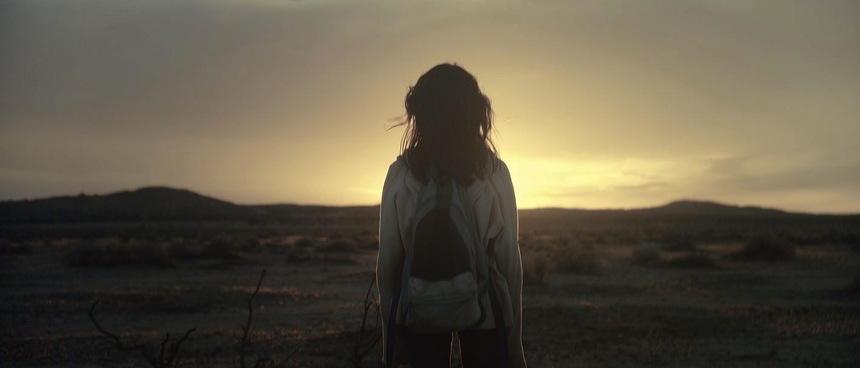LA Film Fest 2014 Review: LAKE LOS ANGELES, Of Loneliness And Limbo In America

Francisco (Roberto Sanchez) is a forty-something Cuban exile living in a ramshackle house amidst a fruit tree grove in the otherwise barren desert town of Lake Los Angeles. Amidst day laborer gigs for near-by estates, Francisco uses his house as a holding point for illegal immigrants who have recently crossed the border. Acting less as a guide and more as a warden, the stoic Francisco, still haunted by leaving his wife and sons behind in Cuba, keeps to himself much of the time. That is until Cecilia (Johanna Trujillo), a 10-year old who has crossed without her family ends up on an extended stay at his residence.
Cecelia may be more proud than he is. She refuses to eat, and ignores most of his kind, fatherly gestures, spending much of her time with a snow globe that is home to a little old man that she speaks to. Just as Cecelia decides to open up to Francisco, she is told her father, whom she had been waiting to be taken to, has paid and will see her now. Turns out that the young driver (Eloy Mendez) who delivers the immigrants to Francisco's doorstep, was lying. Ceclia will not see her father. And so with determination and little else but her backpack, Cecelia flees into the desert.
From here on out the film charts both Cecelia and Francisco's time in this uncanny land of sun-blasted highways, rusty motor homes, and ancient cacti guides. Francisco entertains himself by hiring a prostitute, going to the flee market, admiring the house of an affluent resident he works for. Meanwhile, Cecelia scavenges and steals to survive on the edge of civilization. She is urged on by the whispers on the wind which speak of her father, and the friendship with a little dog, a prisoner to shade of a derelict building.
What's so extraordinary about Ott and company's efforts in charting the plight of these displaced people, and through such a seemingly harsh reality, is that the film never becomes overly political or saccharine, nor cynical in its approach or outlook. The director's lyrical realism, brought forth by the contemplative, dreamy cinematography of Mike Gioulakis, may remind some audiences of early David Gordon Green films, and seemingly the go to answer for anything poetic yet exuding naturalism: Terrence Malick. But Ott's biggest influence and inspiration seems to come from another part of the globe entirely, that of Spanish director Victor Erice's indispensable Spirit Of The Beehive. Indeed, Cecelia's time in the desert, finding an abandoned house and being guided by something almost other worldly, is reminiscent of the young sisters' journey across the plains in Erice's look at the magic and melancholy of the very young.
Lit by the strange half-light of dusk, the shadows often her only companions, Johanna Trujillo as Cecelia brings an astounding intensity and resourcefulness to her often brooding performance. A heightened sense of self and the world around her furthers this, spotlighting an aura that few child actors posses. Ott's own deft sensitivity as director fills out this world with a wonder towards, and understanding of, childhood that is rare to witness on screen.
And lest we forget the wary and trodden adult half of this tale, Roberto Sanchez brings an immediate likeability to Francisco. I mean this man just has charisma pulsing from his towering frame. Because through that hard exterior there is a father and a husband and a poet of a fighter in there. Some of the film's strongest moments come with Sanchez's small gestures, which speak volumes: the way he holds his shoulders as a woman drapes herself across his lap; the way his fingers move across the keys of a piano... it is these moments juxtaposed with the voiceover narration derived from Francisco's recordings to his wife, that make the film sing of hope, yet never not once deny the angst either.
Carried by the gentle editing of Santos S. Santos and with further insight from co-writer Atsuko Okatsuka, Lake Los Angeles' metaphysical, near spiritual exhalation of an immigrant's experience in America is spellbinding to watch unfold. While Ott's previous films have garnered the director good success with festival audiences, Lake Los Angeles is his most mature and measured work, with two of the best performances of 2014 right at its core. So while some of us may have known Ott's talents before, his latest should prove without a doubt a stunning introduction for a whole new audience of moviegoers.

Do you feel this content is inappropriate or infringes upon your rights? Click here to report it, or see our DMCA policy.






